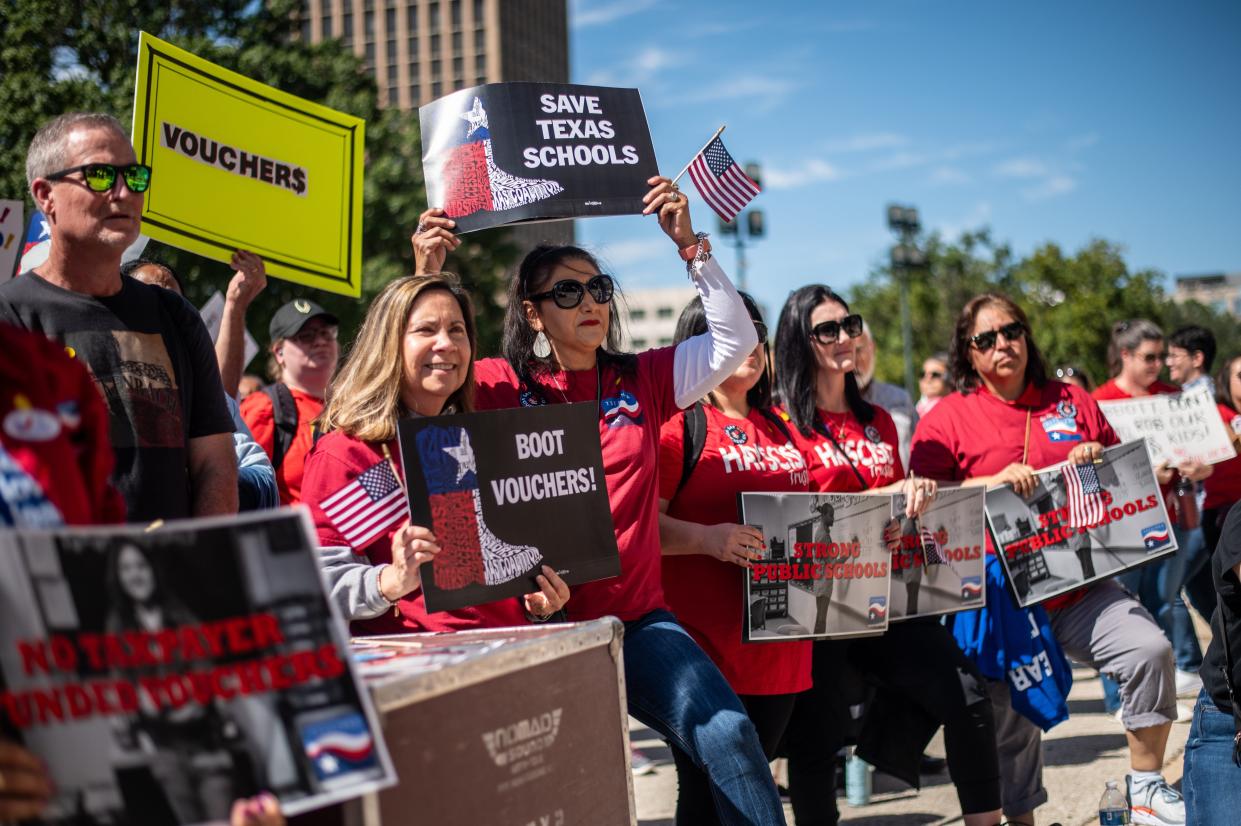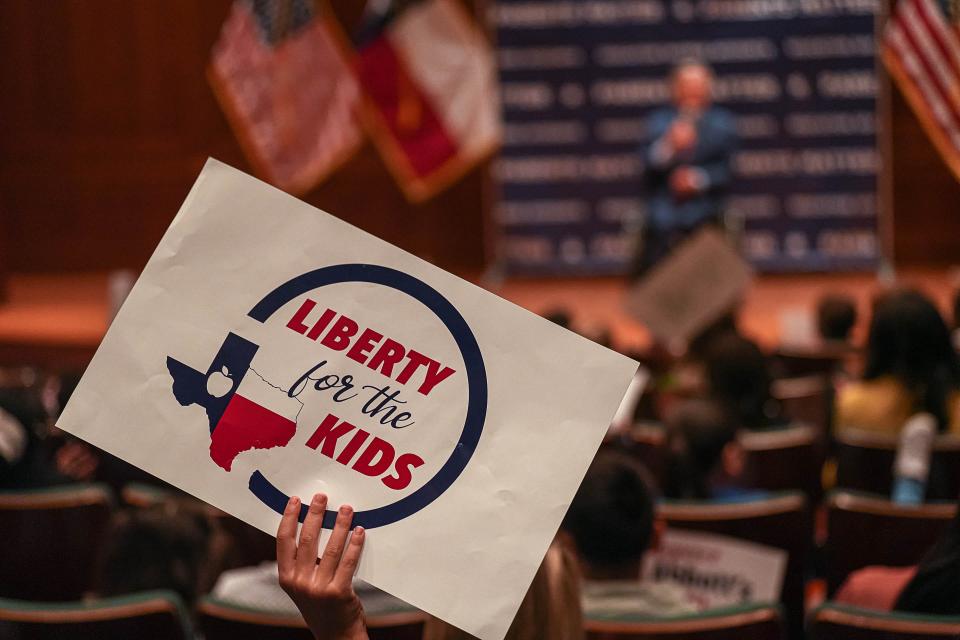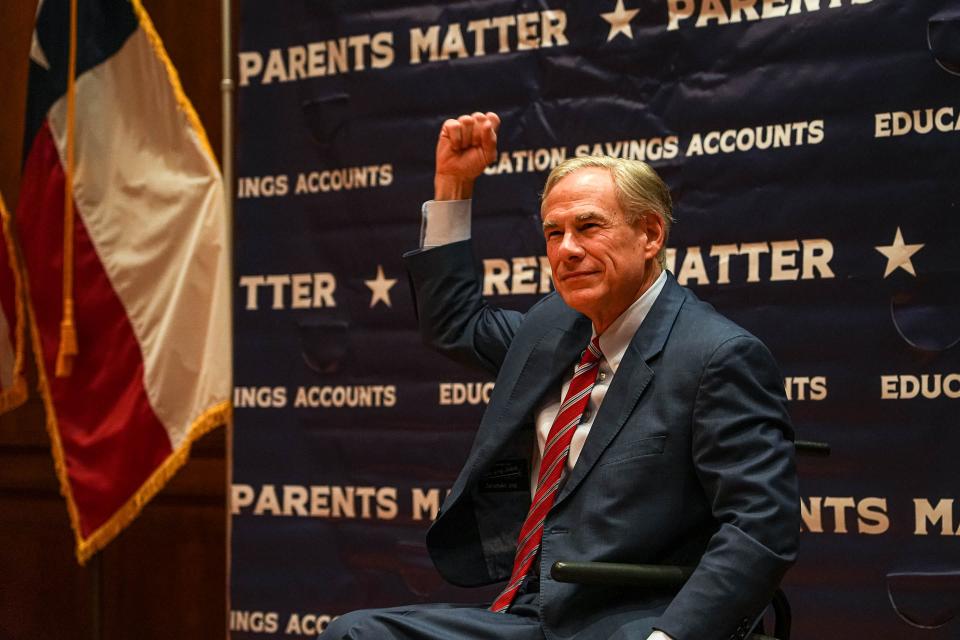As Gov. Greg Abbott continues push for school choice in Texas, deal remains uncertain

- Oops!Something went wrong.Please try again later.
As the final days of the special legislative session wane, school choice proposals continue to bitterly divide state lawmakers, even pitting Republicans against rural members of their party who have joined Democrats in standing against spending state money for private education.
With only two weekdays left in the 30-day session — which Gov. Greg Abbott called specifically to pass school choice legislation, border security initiatives and prohibitions against COVID-19 vaccine mandates — the Legislature has all but run out of time to pass any laws promoting a school voucher program, also called school choice.
Abbott, who has spent part of the year traveling across the state to push education savings accounts — a school choice proposal — however, is likely to call lawmakers back for another 30-day special session to try to get his signature priority across the finish line. On Friday, House education Chairman Rep. Brad Buckley unveiled a newly revised bill that would raise teacher pay, increase per student funding by $540 and create an annual $10,500 education savings account for students who want to enroll in private schools.
Buckley painted House Bill 1, which he released ahead of an anticipated fourth special session this year, as a possible deal that could gain the support of the lower chamber, where a coalition of Democrats and rural Republicans have blocked school choice proposals out of concern such programs would bleed public schools of funding. Buckley said his bill delivers Abbott’s education savings account program and is a feather in the cap for lawmakers who will return to their home districts with a substantial public school funding bill under their belts.
It remains unclear, however, whether House lawmakers who have stood their ground all year will support the new proposal. Democratic lawmakers have said they'll reject any proposal that includes public money for private schools.
Buckley, R-Killeen, published his newly revised 180-page omnibus bill Friday “in the likely event that Governor Abbott calls us back into session next week,” he wrote in a letter to lawmakers. Abbott has previously said he would call a fourth special session if school choice doesn't pass.
The school choice stalemate has opened the door to harsh infighting between the state's top three political leaders, with Abbott fiercely pushing for school choice, even calling on religious leaders to “go to the pulpit” to spread the word about education savings accounts. Lt. Gov. Dan Patrick, who leads the Senate, oversaw his chamber pass an education savings accounts bill in October and the measure has languished in the House. Patrick voiced deep frustration with House Speaker Dade Phelan for his inability to advance the proposal in the lower chamber.
More: Texas House education chair files school choice, funding bill; Abbott signals resistance
Texas House Bill 1: school choice, education funding increases
Buckley’s HB 1 proposes an education saving account program that would give $10,500 annually to any student who wants to attend private school, prioritizing children with special needs or those who are low-income.
Among other school funding increases, the bill also promises a $4,000 bonus for full-time teachers and a $2,000 bonus for part-time educators. The bill would also raise per-student education spending by $540 — up from $6,160 to $6,700 — and adjusts that allocation for inflation starting in 2026.
Teacher pay would also increase with inflation.

The House Democratic Caucus on Friday afternoon reaffirmed its opposition to spending state money for private education.
“ANY bill that includes a voucher scam will take more money out of our schools than it puts in, shortchanging our children and their futures,” the caucus wrote on X, the social media platform formerly called Twitter.
Buckley plans to file the bill immediately upon the start of a new session, he said.
Time for compromise on school choice in Texas?
In the current special session, which ends Tuesday, time is mostly up for a bill to make it through the legislative process. Until last week, Abbott was adamant he wouldn’t let lawmakers pass any school funding proposals until they advanced school choice.
There is room for some kind of compromise on the voucher issue, but playing hard ball might be the wrong approach, said Brandon Rottinghaus, a University of Houston political science professor.
“For Gov. Abbott, it’s all stick and no carrot,” Rottinghaus said. “That’s only going to get you so far in a Legislature that doesn’t want to be pushed around.”
More: Is school choice dead in the Texas Legislature? Lawmakers are at an impasse.
It’s still unclear whether another session will change things for a Legislature that's tired of being away from home, said Randy Willis, executive director of the Texas Association of Rural Schools, which represents about 375 districts.
“In my understanding, they’re just really, really far apart,” Willis said. “I think you’ll see the same thing in the next session until there’s something that can bring the two sides together.”
Like many school superintendents, Willis sees vouchers as a direct attack on public schools, a draining of funds and resources that sustain school districts, especially those in rural Texas where campuses — along with churches — are one of the main centers of community life.
Rural Republican lawmakers who oppose vouchers are just doing what they were elected to do, he said.
“All they’re doing is protecting community schools, which is the heart of Texas,” Willis said.
Jeanne Allen, founder and CEO of the Center for Education Reform, which advocates for school choice programs, said a deal for such a proposal in Texas is necessary.
“Parents are frustrated,” Allen said. “There are minority children, disadvantaged children, that don’t have access to schools that meet their needs. There are high performing suburban schools that can’t deliver everything that students want.”

Allen is hopeful lawmakers will come to a compromise and thinks Abbott should bring them back right away, she said.
“His resolution to bring people back immediately and keep them in until this is done is true leadership,” Allen said.
Abbott’s political strategy of refusing any kind of compromise has been somewhat puzzling to Rottinghaus thus far, but the governor's focus on school choice makes sense for a long-term plan.
“That gives him credibility on the national stage, which is what a candidate would have to do to be relevant in a future Republican primary,” Rottinghaus said. “The next generation of fights in the Republican Party will be among those governors who can provide those conservative policies and those who can’t.”
This article originally appeared on Austin American-Statesman: Texas Legislature: School choice fight likely headed to fourth session

